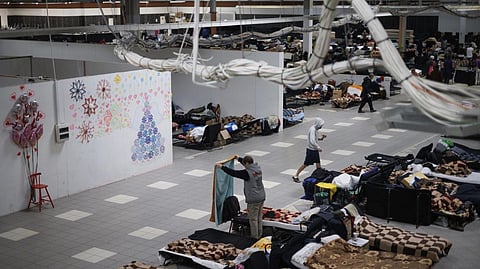

The refugee crisis, a topic that gets shoved under the carpet whenever world leaders get together, was highlighted once again last week in the aftermath of a tragedy. As many as 60 migrants including 12 children, were reported to have drowned after their boat broke up off the southern coast of Italy. The vessel carrying around 140-150 people from Pakistan, Afghanistan, and Somalia was wrecked after departing from Izmir in eastern Turkey.
This might not be the last of such tragedies as people at risk of political persecution, who flee strife-torn regions end up losing their statehood and their lives almost every day. As per a Nov 2022 report from the International Organization for Migration’s (IOM) Missing Migrants Project, over 50,000 migrants are known to have died worldwide since 2014, having risked their lives on dangerous journeys. The UN migration agency IOM remarked that no action had been initiated by any country of origin, transit or arrival, with regard to these refugees.
The nationality of over 30,000 people (60%) who perished and were documented in the Project remains unknown. Among those who were identified, 9,000 hailed from Africa, 6,500 from Asia, and 3,000 from the Americas. The top three nations identified as the country of origin of the refugees were Afghanistan, Syria and Myanmar, regions marked by violence for years together. Children made up more than 11 per cent of the lives lost on migratory routes in Asia, which is the highest proportion of any region.
Now, following the Russian invasion of Ukraine, 8 million refugees have fled the nation, while 6 million people have been displaced internally. Europe’s inherent bias with regard to refugees from within its own territories was laid bare when nations like Poland rolled out the red carpet for Ukrainian migrants, guaranteeing them a stay in the nation for up to 180 days, granting them access to the labour market, healthcare services and social benefits. This is in contrast to the manner in which migrants from nations like Afghanistan, Syria, and Iraq, were stranded in forests adjoining the Polish-Belarusian border, where a barbed wire fence was erected to keep illegal migrants off.
A similar story played out in Britain where the government planned on offering financial incentives to British families that hosted refugees from Ukraine. But the flip side of that generosity was that the UK has also considered sending illegal immigrants to Rwanda on a one way ticket. The idea is to deter refugees arriving in the UK through illegal and risky means like small boats sailing through the English Channel.
With regard to refugees, experts believe that obligations under international law, including the right to life, should be honoured at all times. A concerted effort is required on part of national governments to work together to prevent and bring down the instances of further deaths of migrants. This can be done by prioritising search and rescue operations, while improving and expanding regular and safe migration pathways. It is essential that migration governance prioritises the protection of people on the move.
Let’s not forget, the refugee crisis we see today has a lot to do with the foreign policies of economies in the global north who left nations in the global south high and dry after exploiting them for their own gains. So it’s a moral imperative that nations with the means help solve this situation sans prejudice.
Visit news.dtnext.in to explore our interactive epaper!
Download the DT Next app for more exciting features!
Click here for iOS
Click here for Android